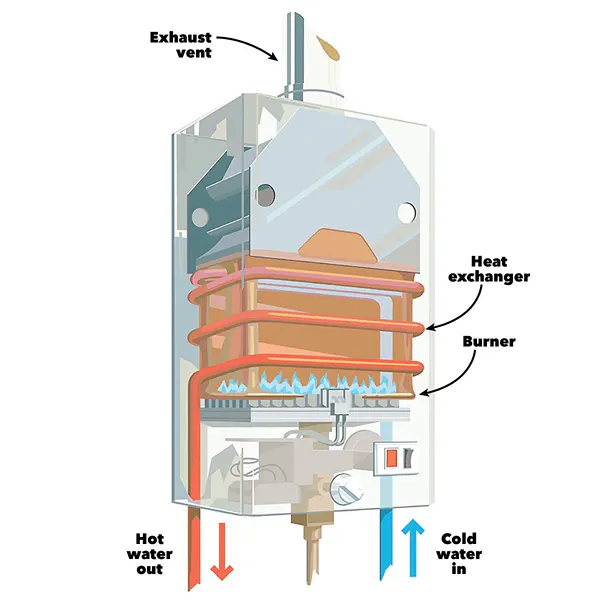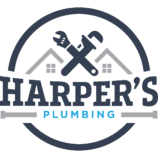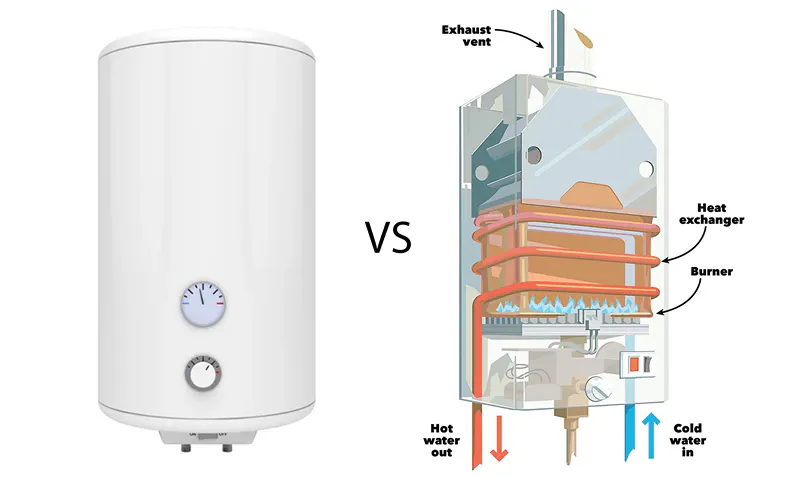(Updated: Mar 12)
Whether you find yourself wanting to upgrade, or your tank has suddenly quit working, the decision to buy a traditional hot water tank, or invest in a tankless system can seem overwhelming.
A few basics… A traditional hot water tank has a contained specific amount of hot water, usually 40 or 50 gallons. When your household requires hot water, for showers, laundry or dishes, water is pulled from the hot water tank and refilled and reheated, ready for the next use. This is the system homeowners are most commonly familiar with.
Tankless systems, also known as Instantaneous, Demand water heaters or in-line water heaters have been around for many years. A tankless system heats the water it needs as it passes through the unit, therefore reducing energy consumption by not heating extra water all day that is not being used. A basic diagram of how the Tankless system works is below:

When was the first tankless system invited? Surprisingly this technology dates back to 1868 when Benjamin Waddy Maughan patented the first instantaneous water heater.
In 1929, Stiebel-Elton invented the first electric tankless water heater. Later gas-powered models were developed which proved to be more efficient and therefore became more popular. As tankless systems are smaller and take up less space, the technology was utilised more in the European and Asian markets. In the 1970s the modern tankless water heater system that we are more familiar with was introduced. However, it was not until about 30 years ago that the tankless system became more popular in the North American market.
So where does that leave us today?
There are 2 main things to consider when looking at your next hot water heating system solution, cost and efficiency. But the answer is not universal, this is a truly individual question that needs to account for your specific situation and needs.
1) Cost
Whether it is a traditional tank or tankless, the first item most people look at is the initial price tag for the new hot water heating system. When looking at a traditional hot water heater versus tankless, the higher upfront cost of a tankless system becomes a primary disadvantage.
It is important to note, when getting hot water system quotes, make sure they account for the basic installation costs and any changes in venting or piping that might be necessary.
At Harper’s Plumbing we can look at your current system and provide a customised quote tailored to your current piping and venting situation and account for any changes that might be needed.
2) Efficiency
Bottom line, tankless hot water systems only use energy to heat up the water as it is needed, saving you money. According to the U.S department of Energy “tankless gas water heaters should save approximately 33% on hot water heating compared to a conventional storage water heater” and has also been cited to save a typical family about $100 or more per year, depending on water usage. The amount of energy savings fluctuates based on individual household usage.
Plus, if you find yourself with a tankless system and still require more hot water in your household, you can simply add another tankless system to help meet the higher hot water demands.
Space Efficient Too!
Tankless systems take up less floor space as they can be mounted on a wall and are relatively compact.
What is in our home? While we have purchased properties with traditional hot water tanks, and have used tankless systems as well. Currently we have a conventional indirect hot water tank, which means the hot water is heated by a boiler. The hot water recovery rate is lower than a tankless system, but offers a higher flow rate.
Let’s connect and discover what works best for you. We also offer flexible financing options to make your new Hot Water Heater purchase manageable and fit your budget. Contact us today!






